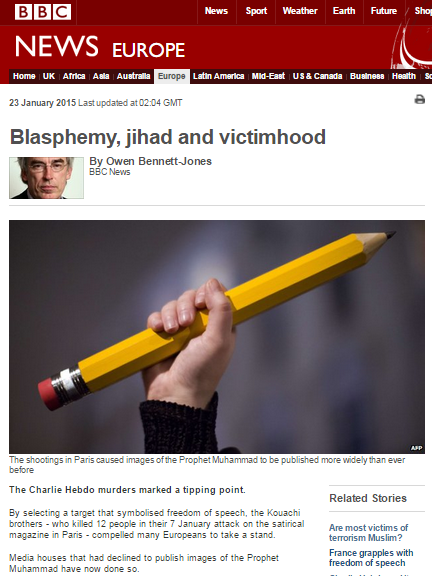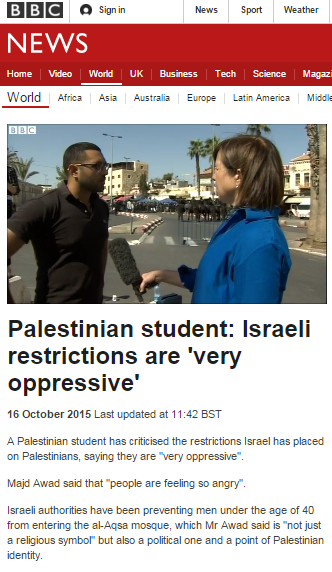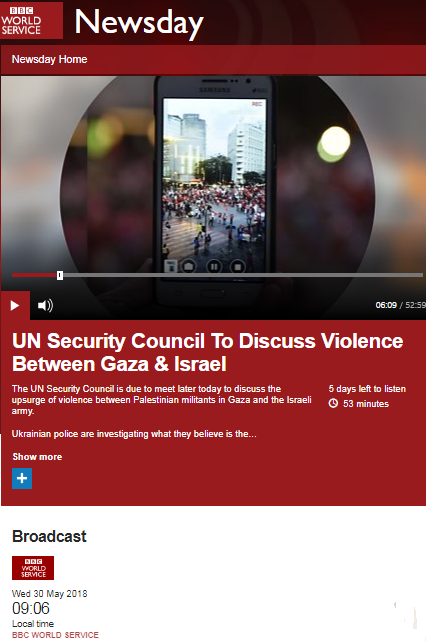“The BBC will use the opportunity presented by its long-form documentary and current affairs output to explore a wide range of contemporary issues that can engage a variety of viewers across TV, radio and online. A key priority for the BBC will be to provide explanation and analysis of the complex issues that confront the UK and the world (such as the Middle East, global terrorism and climate change). The BBC will offer in-depth, multi-platform seasons as a means of engaging audiences in relevant big issues and helping them make sense of the world.” [emphasis added] (Source: BBC Public Purposes: Sustaining Citizenship and Civil Society)
The plethora of information available to anyone in our modern world at the click of a mouse is of course both a blessing and a curse with the challenge being to sort the factual wheat from the often agenda motivated chaff. The BBC clearly has an important role to play in helping its audiences distinguish between the fact and the fiction surrounding news and current affairs in order to enable them to reach informed opinions and indeed the BBC Trust states that:
“All BBC journalism will display the core values of independence, truth and accuracy, impartiality, fairness, and diversity of opinion.”
In that laudable statement of intention, however, lies a pitfall. The diversity of opinion the BBC commits itself to reflecting may not always be compatible with the other core values to which it professes to adhere simply because people hold a wide range of opinions which are obviously not always rooted in fact.
If a BBC report tells audiences that some people are of the opinion that the earth is flat, the corporation’s commitment to truth and accuracy should surely also mean that it is obliged to inform them of the available facts contradicting that opinion. Or should the BBC refrain from amplifying opinions which may indeed be “diverse” but cannot be defended as being based on fact?
It is not difficult to find BBC reports in which non fact-based opinion is promoted without qualification. For example, we not long ago witnessed commentators expressing the ‘opinion’ that a Palestinian bus driver who committed suicide had been murdered by Israelis with little or no challenge from BBC interviewers and on January 8th the BBC News website found it appropriate to amplify the opinion expressed in an Iranian newspaper that the terror attacks in Paris were a joint ISIS-Israel operation.
On January 23rd another example came to light in an article by Owen Bennett-Jones appearing on the BBC News website’s Europe page under the title “Blasphemy, jihad and victimhood“.
There, readers were told that:
” […] Blasphemy is the lead story now with political chat show hosts asking: “What is it? How come people take the issue so seriously?
And shouldn’t secular West European countries worry about racist or misogynist speech as much as blasphemy?”
Such discussions almost always develop into a row about power. Political Islamists and Western liberals often argue that Muslim sensitivities about public challenges to their faith and identity are informed by the fact that over time they have been colonised, invaded, tortured and falsely imprisoned by Westerners.
The US and Israel, they argue, are the subject of so much invective and even violence because, for all their talk of human rights, they hypocritically use their own strength to oppress Muslims, whether in Iraq or Gaza. Furthermore, it is argued, Muslims are singled out for abuse.”
There may indeed be people in this world who hold the opinion that they can ‘explain’ anti-Israel campaigning and violence against Israeli citizens by means of the false claim that Israel ‘oppresses’ Muslims in Gaza but that view is not rooted in truth and accuracy.
The trouble is that in his smörgåsbord presentation of the “diversity of opinion” on an issue which he makes no real effort to resolve, Owen Bennett-Jones does not make it clear to readers that there is no factual basis for that particular opinion. He avoids any explanation or analysis of the agendas of the “political Islamists” and “Western liberals” making that fictitious claim and thus – intentionally or not – he contributes to audiences’ further confusion.
Likewise, the additional reflection of ‘opinions’ from Bennett-Jones which follows that one does nothing to clarify to BBC audiences either the actual circumstances behind the incident concerned or the deliberate conflation of anti-racism with censorship inherent in that view.
“Thus, while the Charlie Hebdo management sacked a cartoonist for anti-Semitism, it did not hesitate to publish anti-Islamic cartoons.”
The admirable aspiration to provide “explanation and analysis of […] complex issues” and to help its funding public to “make sense of the world” cannot be achievable as long as the BBC promotes and amplifies agenda-based statements without the qualifications made necessary by its commitment to accurate and impartial journalism. The trouble is that many at the BBC obviously first need to clarify the difference between the fact-based and agenda-based to themselves.




